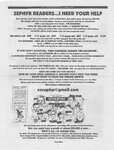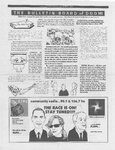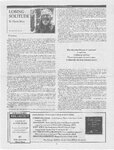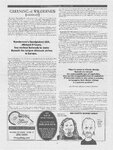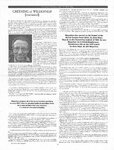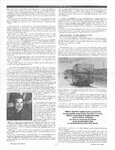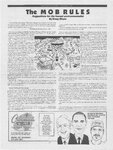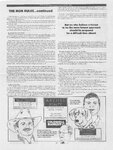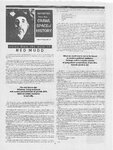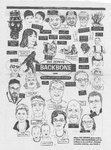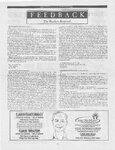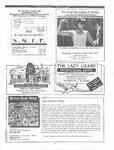| OCR Text |
Show THE ZEPHYR/AUGUST-SEPTEMBER 2008 fancy free is a great pleasure that I couldn't live without. I am not dissing wild country LOSING SOLITUDE ventures, though I sometimes feel sad when I consider what motorized vehicle drivers and mountain bikers are missing. The crucial fact in all of this is that it doesn’t get down to root causations, where “varnmental” tactics have to penetrate to create real change. Behind this collective conscience lies another layer of causation, the Industrial/Military Complex whose intrusion into conservation efforts is astounding. I'll take you on a tour of one of those Big Green outfits, The Wilderness Society. As Stiles notes in his cover story, the current governing board members include: Caroline Getty, an heir to the Getty fortune; Doug Walker, chairman of the board of REI; Hansjorg Wyss, whose estimated worth is 8.7 billion; Scott Nathan, managing director of By Martin Murie a Boston-based investment firm; Brenda Davis, one of the vice presidents of Johnson and Johnson; David Bonderman who has multiple connections in the zillionaire world; Marcia Kunstel, who owns one of the most beautifully-sited dude ranches in Teton county, Wyoming, formerly owned by an heiress known locally as The Countess. Now, shift scenes to 1935. Consider Bob Marshall, from a fairly wealthy family, a foot traveler par excellence, veteran of arctic exploration, on staff of the Bureau of Indian Af- skerihog@westelcom.com fairs where he had initiated wilderness set-asides. He later moved to the Forest Service as chief of recreation and lands. : Bob had a vision. He met with ecologist Aldo Leopold, author of Sand County Almanac and other writings; Robert Sterling Yard, publicist for the National Park Service; Benton Pristine That word and its equivalents go way back, to the eighteenth and nineteenth century England and throughout the British Empire. The key word for Nature appreciation was sublime. In the nineteenth century Americans, probably influenced by English forbears, discovered Nature, a place to visit to escape city life and its “artificiality.” MacKaye, “Father of the Appalachian Trail”; Ernest Oberholtzer, fighter for forests and waterways in Minnesota and Ontario, canoe traveler to arctic regions, who had created cordial relations with Indian peoples throughout those vast wild areas; Harvey Broome from Tennesssee, defender of wild lands in the south; Benard Frank, C. Anderson, both wilderness combatants. Cities, a system built by us, had nothing to do with esthetic thrills and spiritual refreshment that one gained when going into wild country. That fragile separation is valid, but not by any means the entire truth. I am not discounting the long saga of “going wild,” seeing the wonders, enduring adventures, observing the grand diversity of plants and animals, but we might try to understand to some extent the lives of the great majority of Americans, farmers and workers, who in these chaotic times are intimately involved in nature’s workings in urban and country locales---the good and the bad. For many it is a life-and-death struggle. The idea that Nature is “pristine” is not true. Neither is sublime. Those terms reek of contrivance. Neither fits the true existing world. The universe, the unknown forces behind the spectacle, proceed on their own courses, and what we humans contributed has been until recently a very minor part of that spectacle. In the last few hundred years, our impact on Earth systems became gigantic and it grows more critical, day by day. Further, as we know by now, many of the acts of Nature, whether triggered by us or not, are devastating to our species. The majority of the world’s peoples know that in their very bones: diseases, dangerous animals, toxic plants, lawyer, and Harold The idea that Nature is “pristine” is not true. Neither is sublime. Those terms reek of contrivance. Neither fits the true existing world. droughts, floods, tornados, tsunamis, earthquakes, volcanic eruptions, storms at sea, and dangerous work on oil platforms, building sites, chemical works, fabricating factories, power lines--places where things can go wrong and do go wrong. All of this is part of Nature because we are one species among many built by evolution, blessed and damned by our amazing intelligence. But we can’t get outside of this unpredictable universe. Pristine is a term used by Bill Meadows, Director of the Wilderness Society, by Brooke Williams of the Great West Institute and by countless other devotees and protectors of wilderness. It has been used lavishly in successful battles to keep oil and gas drilling out of the Alaskan National Wildlife Refuge, but victories like that tend to be temporary--certain special places have to be defended again and again. A recent example is the roadless rule established by Bill Clinton, once more under attack. This newest encroachment has been beaten back, but there is a serious flaw in the victory: Tongass, the largest National Forest, is exempted from the roadless rule. Loggers will be moving in, cutting big trees. Why do we pursue this battle cry that wild country is pristine? Because it has easy appeal; the idea of spiritual refreshment and esthetic views in an Edenic and mythic paradise are embedded in our collective conscience. Again, why? Be- They worked out the aims of a new organization, The Wilderness Society. Its goal would be, and still is, the rescue of wilderness areas on public lands--National Parks, National Forests, Bureau of Land Management lands, Wildlife Refuges. Bob supplied most of the funds for the modest office in Washington, D.C., the salaries of the Executive Director and Ediitor of The Living Wilderness, and per diem expenses. Next scene change, 1947, the STS ranch in Jackson Hole, Wyoming on the banks of the Snake river. Bob Marshall had died; his brother George stepped in as Wilderness benefactor. Here are the Council members from that summer: Benton MacKaye, from Massachusetts, who owned one black, threadbare suit for formal occasions; Howard Zahniser, literateur, performance poet and the exec and editor who held down the office in D.C; Olaus Murie, one of the field biologists for the Bureau of Biological Survey; Bernie Frank, a lawyer from the Seattle area; Ernest Oberholtzer and Harvey Broome. 2 : The Council’s business meetings were held on a bright sunshine circle in a clearing in a grassy sage area. Mardy Murie and my sister Joanne fed everybody from the homestead cabin’s kitchen. After two or three days of business matters, the Council went off on their cause we visualize our current civilization as bad, but we are stuck with it, so we persist. We escape for short runs in off-road contrivances, climb, hike, camp, feel free and annual visit to a public lands wild place. Relations with Park Service and Forest Service were cordial in those days, the forties, a period of progress in the wilderness scene. easy and in tune with Nature. If we run into troubles--mosquitoes, blackflies, rain, cold, thirst...that is part of the balance of nature, part of the adventure, away from the evils of unemployment, business failures and climate change, but the elite rich weasels continue their ruthless privatization and disneyfication of everything. Yes, everything. For a meticulous following, day-by-day, of these processes see Scott Silver’s web site: www.wildwilderness.com. Do wars and economic disasters and climate change have anything to do with wilderness preservation? Yes, absolutely, because it is all one huge shebang, rapidly running out of control. Refusing to list polar bears as endangered is directly connected with the insane urge to grab every drop of oil on the planet, even in Arctic seas where polar bears try to adapt to ice melt and tundra softening, and these events are directly related to the military establishment whose use of oil is the largest fraction of our share of that dwindling, and precious, resource. That’s one example. civilization where we labor and feel depressed and un-free. These are realities, but they are not set in stone; they are simply “the way things are.” “So now in our West, artists are trying to run their eyes clear of mythic and legendary cobwebs, and see . . .straight to the beating meaningful heart of things..” Willim Kittredge, chapter heading from Stewart 1. Udall, The Forgotten Founders, Island Press, 2002. Speaking from my own experience, the exhilaration of being out of doors on foot and NOW AVAILABLE BREAKOUT A NOVEL BY MARTIN MURIE A cross continent struggle to save people and other endangered species. $15 mee Order direct from Martin Murie Those days are long gone. We now have violations of law by our government, wars and ORDER SIGNED COPIES DIRECT FROM MARTIN MURIE: LOSING SOLITUDE: A contemporary Western. Developers invade a cowtown....$14.95 WINDSWEPT: Birdwatchers 6 a biker from Montana tangle with _ corporation extremists in Medicine Bow, Wyoming....$14.95 BURT’ S WAY: Environmentalists labeled ‘terrorists, keep a’ chuggin’ on the Quebec/New Y ork border...$12 RED TREE MOUSE CHRONICLES: Forest animals on assignment; What is the future of the forests? They turn activist...$6.00 = SERIOUSLY INSISTENT: 80 pages of activist critique...$7.00 Plus Postage---§2.20 for the first book, $1.00 for the second. BO North B iee vee |


